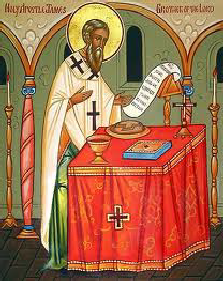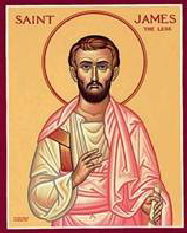
 |
Orthodox Outlet for Dogmatic Enquiries | Bible |
|---|
|
"James" or "Jacob" in the Bible?


Apostle Jacob/James,
of Zeb
Jacob, the Just - “Godbrother” of
Jesus
Apostle Jacob/James |
|
The problem of names surfaced at a recent Bible study at the St.
Paul Union Church in Antalya, Turkey. Pastor Dennis Massaro was
discussing the three men named “James” in the New Testament: Two
were apostles, and the third was the leader of the Jerusalem church
and author of the eponymous letter—the Book of James. Participants
in the study came from a range of countries, including the
Netherlands, Iran, Mexico, Moldova and Cameroon. When I asked what
the name of these men was in their languages, they all said “Jacob.”
When I was teaching a course on the New Testament General Letters
(Hebrews through Jude), I began by introducing the Book of Jacob,
also known as the Book of James. Students were perplexed until they
learned that Jacob is the proper translation of the Greek name Iakōbos.
One student wrote later that knowing this “turned my understanding
of the writing upside down.” Another observed that “with the name
change, the loss of the Jewish lineage occurs.”
So how did the Jewish name Ya’akov become so Gentilized as James?
Since the 13th century, the form of the Latin name Iacomus began
its use in English. In the 14th century, John
Wycliffe made the first Bible translation into English and
translated Iakobus as James. (However, in both the Old and
New Testaments he arbitrarily used the name Jacob for
the patriarch).
In all future English translations the name stuck, especially after
1611, when King James I sponsored the translation then called the
Authorized Version. Since 1797 it has been called the King James
Bible.
So what is lost by using James instead of Jacob? First, it has
created an awkwardness in academic writing. Scholars providing a
transliteration of James indicate Iakōbos, which even lay
readers know is not the same. Hershel Shanks has noted that the
reason Israeli scholars failed to understand the significance of the
eponymous ossuary is
that they didn’t connect James with Ya’akov.1
Second, James’s ancestral lineage is lost, as the student noted
above. In Matthew’s genealogy, we learn that Joseph’s father was
named Jacob (Matthew 1:16) and that his family tree included the
patriarch Jacob (Matthew 1:2). James was thus named after his
grandfather. As Ben Witherington writes, “It is clear that the
family of ‘James’ was proud of its patriarchal heritage.”2 So
Jacob was the third Jacob in the family.
Third, James’s Jewish cultural background is minimized. Tal Ilan
identifies Jacob as the 15th most popular name in Palestine in
antiquity, with 18 known persons carrying it.3 Including
both the Eastern and Western Diasporas, Jacob was the third most
popular Jewish name, with 74 occurrences.
Fourth, the Jewish literary heritage is muddled. The Book of Jacob
(i.e., the Book of James) is addressed to “the twelve tribes in the
diaspora” (James 1:1) and full of references and allusions to the
Torah and Wisdom Literature of the Jewish Bible (Christians’ Old
Testament). Scholars consider James the most “Jewish” book in the
New Testament. Its genre is considered to be a diaspora letter like
Jeremiah 29:1–23 and the apocryphal works The Epistle of Jeremiah,
2 Maccabees 1:1–2:18, and 2 Apocalypse of Baruch 78–86.
For these reasons, changing English translations of James to Jacob
makes a lot of sense. In my lifetime we have adapted to a number of
name changes: Bombay to Mumbai, Peking to Beijing, Burma to Myanmar,
and Rhodesia to Zimbabwe. These changes were soon incorporated by
the media as well as in subsequent editions of geographical and
historical books. Making such an onomastic adjustment need not be
too difficult in religious circles, either.
But can such a switch be made practically? Biblical scholars and
publishers would need to agree that continued use of “James” is
linguistically indefensible and culturally misleading. Most
difficult to change would be Bible translations, which are very
conservative. To start, a footnote could denote that James is really
Jacob. And while we’re at it, let’s rehabilitate Jacob as the name
of two of Jesus’ disciples/apostles. These connections, now lost
only for English readers, were caught by Greek-speaking audiences as
well as modern readers of translations in most other languages.
Let’s give Jacob his due.
|
Article published in English on: 13-11-2019.
Last update: 13-11-2019.